May 31, 2025 | 18:33 GMT +7
May 31, 2025 | 18:33 GMT +7
Hotline: 0913.378.918
May 31, 2025 | 18:33 GMT +7
Hotline: 0913.378.918
In recent years, in Ha Tinh area, many people from other provinces have come to borrow forest canopy to raise bees. After a while, these beekeepers moved to other localities. Nomadic beekeeping is difficult but brings high and stable income.
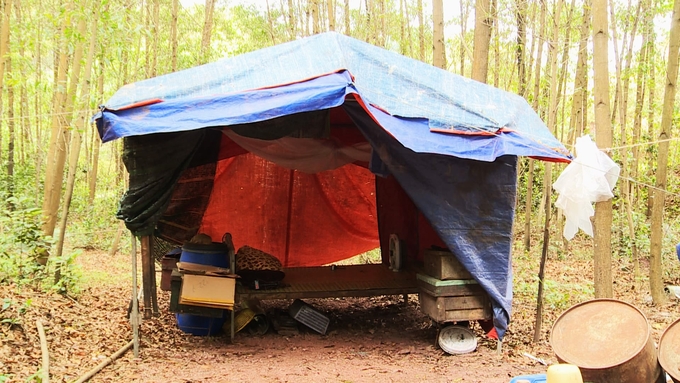
Temporary camps, the here-and-now life of nomadic beekeepers. Photo: Nguyen Hoan.
Only 33 years old, Mr. Le Phi Long, from Bien Ho commune (Pleiku City, Gia Lai province) has been a nomadic beekeeper for 12 years. Every year, in the fourth lunar month, he returns to the acacia plantation area in Luu Vinh Son commune (Thach Ha district, Ha Tinh) to raise bees. Even though his life is here and there, his living conditions are poor, but he is still very attached to his job, loves his job, and always tries to earn more income.
Mr. Long shared: This profession requires a lot of traveling, often to unfamiliar areas, so man has to gradually adapt to life in a new place. All daily activities are located only in temporary camps to protect from the rain and sun, lacking everything but in return the income is quite high and stable.
“This job requires you to eat and sleep with the bees to guard, check, and take care of the bees. When the trees have many flowers, the bees produce a lot of honey. When there are few flowers, farmers have to feed the bees more soybean meal and sugar, so as not to let the bees go hungry," Mr. Long said.
Having many years of experience in nomadic beekeeping, and having traveled nearly 1,000km, Mr. Vu Huu Thuan (born in 1974) brought more than 200 beehives from Dak Lak to Ha Tinh to raise. Bee colonies are raised in wooden boxes placed in a row in the middle of the acacia forest in Huong Son district.
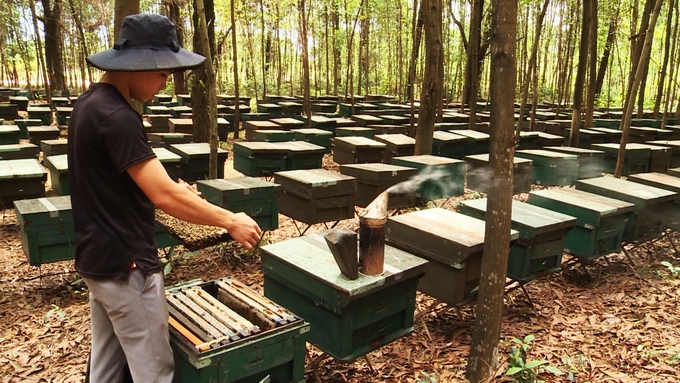
This year, the weather is favorable, so bees raised in the acacia forest in Ha Tinh have produced good honey yields and stable prices. Photo: Nguyen Hoan.
Mr. Thuan shared that because the bees move according to the flower season, the quality of honey in each season and time is different. If you keep bees without moving according to the flower season, leaving the bees in one place, many bees will starve, die, and some groups will even abandon the hive and fly away.
"Doing this job requires following the bees to move around the provinces, rarely being at home. I have been doing this job for more than 10 years. Although the work is hard, I still try to do it to earn extra income. Being here from April to October, each flowering season will yield about a few dozen tons of honey. When the honey is harvested, the company will buy it on-site. This year, the weather is favorable so the honey is of high quality," Mr. Thuan said.
Beekeepers said that from April every year, they start bringing bees to the Central and Northern regions. At this time, many flowers bloom, so it is very favorable for bees to make honey. At the end of October (solar calendar), when the flower season ends and the weather turns cold, the bees are moved to the Central Highlands to raise, preventing damage from storms and cold that often occur in Ha Tinh.
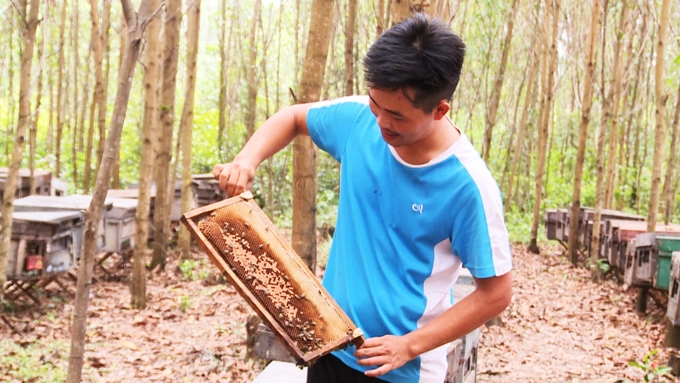
Although it is difficult, nomadic beekeeping gives a fairly high and stable income. Photo: Nguyen Hoan.
In early April this year, Mr. Tran Dang Phong from Ha Nam province followed his father to move bee colonies to the acacia garden in Cam Quan commune (Cam Xuyen district, Ha Tinh). Mr. Phong said that his family has a tradition of beekeeping and gardening, so when he finished high school, he followed his father in the business. At this time, his father was returning home, and he was the only one left to look after the bees.
According to Mr. Phong, honey can be harvested every 15 days. With 350 existing beehives, he can collect 1 ton of honey/month, minus expenses, and still yield a profit of VND 13 - 15 million/month.
Nomadic beekeepers know by heart which flower seasons produce delicious honey, the flowering seasons, and which lands they can visit.
According to Mr. Phong, when the acacia honey season in Ha Tinh ends, there will be rubber honey and coffee season in the Central Highlands, and the longan and lychee flower season will return to the North. Usually bee farms are located close to each other to help each other turn honey to save costs. If the farms are far apart, they have to hire many local workers to keep up with the schedule.
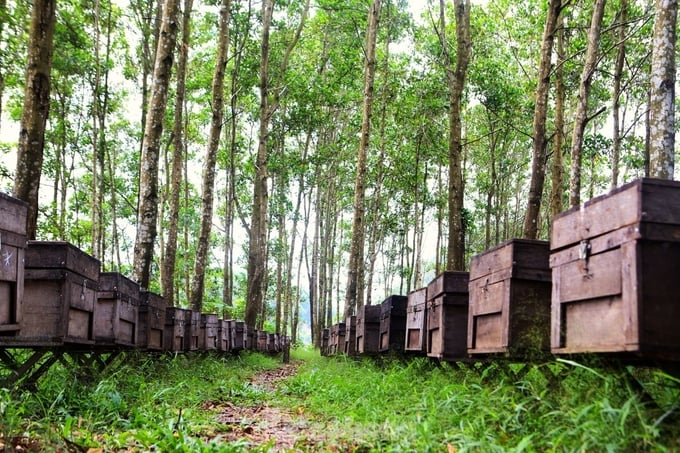
The vast acacia forests in western Ha Tinh are very suitable for beekeeping during the flowering season. Photo: Nguyen Hoan.
During flower season, nomadic beekeepers travel thousands of kilometers to reach new lands. They diligently and quietly offer life the sweet scent of honey, nature's purest gift. This year, nomadic beekeepers are excited because the weather is quite favorable, the honey harvest is good, and the selling price is more stable than in previous years.
According to farmers, the honey collection process is also quite complicated. After the wax covers about 2/3 of the tray, the farmer must use fumigation to chase the bees away. The honey collection cycle depends on the weather, usually lasting 10-15 days/time.
According to the experience of nomadic beekeepers, in addition to weather factors and a forest full of flowers for bees to collect honey, choosing a direction to place wooden boxes to avoid drafts and harmful insects is also very important to help the bees grow and develop well. Under the cool acacia forest canopy is an ideal place to place a wooden beekeeping box. In particular, unlike other flowers, grasses and herbs, acacia trees secrete nectar from young leaves, which is very convenient for bees to collect honey.
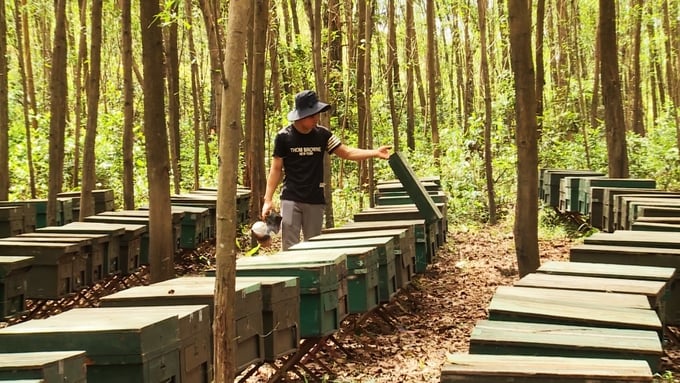
Localities need to create favorable conditions for nomadic beekeeping. Photo: Nguyen Hoan.
Honey raised under forest canopy has high yield and quality and needs to be encouraged to develop. Besides, during the honey harvest period, the temperature in Ha Tinh province is commonly from 37 to 38 degrees Celsius, in some places it is over 39 degrees Celsius, with intense heat. Therefore, the forest rangers of Ha Tinh province always promote propaganda for nomadic beekeepers to take measures to prevent and fight forest fires and not bring fire into the forest to ensure property safety, especially in areas of key forests, prone to fire.
Despite working hard here and there, living far from home, nomadic beekeeping is still the main livelihood of households in provinces such as Ha Nam, Thanh Hoa, Gia Lai... Therefore, party committees, authorities and civil servants not only strengthen the management, but also create favorable conditions for the beekeepers to develop their profession.
Translated by Bao Ngoc
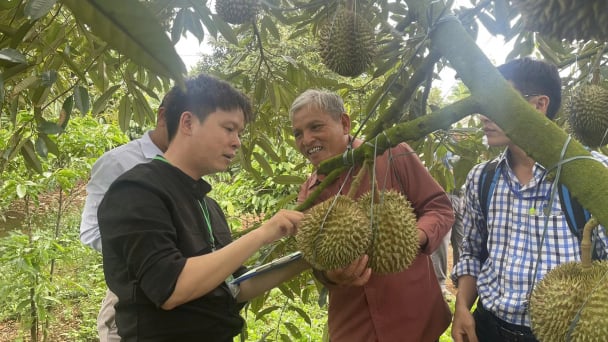
(VAN) For the durian industry to succeed, the value chain must fulfill its commitments to the government, the community, and international partners.

(VAN) Vaccinating juvenile pangasius helps reduce disease, antibiotic use, and farming costs, increasing profits for export-oriented farmers in An Giang.

(VAN) Due to a limited supply of workforce and competitive recruitment requirements, businesses struggle to retain talented veterinary human resources.

(VAN) WOAH’s guidance aims to mitigate disease risks through a One Health approach that balances economic, conservation, and public health interests.

(VAN) Ms. Nguyen Thi Dung, Deputy Director of Ngoc Hoang Cooperative, shared about the journey of bringing dragon fruit to Europe, achieving annual revenues in the billions of VND.

(VAN) Bamboo products from Thang Tho Bamboo Cooperative have reached many countries around the world, while also creating jobs for local workers.

(VAN) The Management Board of Con Dao National Park reported that a green sea turtle, tagged in the Philippines, has traveled thousands of kilometers to lay 84 eggs on Bay Canh Islet.